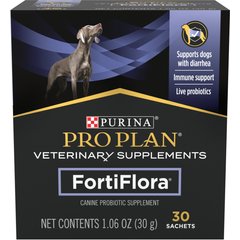Vet Review: Purina® Pro Plan® FortiFlora Probiotic
Vet Verified Product Review: Purina Pro Plan FortiFlora Probiotic Powder
Purina Pro Plan FortiFlora Probiotic Powder is a top choice among our veterinarian panel due to its ease of use, palatable flavor, and top notch ingredients. Learn more about this supplement and why vets recommend adding it to your pup's diet, no matter their life stage.
Recommended Products
Main Ingredients
- Liver flavor. Derived from hydrolyzed poultry and pork liver, this ingredient is highly palatable to most dogs.
-
Enterococcus faecium. Also known as E. faecium, this beneficial bacteria lives in your dog’s gut. It is the most common bacteria in the gut and plays a vital role in a healthy gut biome. The gut biome is the mix of beneficial organisms that live in the gut, including bacteria, protozoa, fungi, and even viruses.
-
Vitamin C. Vitamin C is a water-soluble vitamin (meaning it dissolves easily in water). Dogs can synthesize vitamin C in the liver. In the body, it aids in tissue growth, reduces stress caused by oxidation, and may help boost the immune system.
-
Brewer’s yeast. Known scientifically as Saccharomyces cerevisiae, brewer’s yeast has been shown to support healthy numbers of bifidobacteria in the gut. Bifidobacteria is a beneficial probiotic bacteria.
-
Vitamin E. Vitamin E is an antioxidant vitamin that has a number of important biological functions. In dogs with arthritis, it has been shown to control inflammation and reduce pain. Vitamin E is often included in products as a general-health and immune-supporting ingredient.
-
Zinc. Zinc is a trace element (small amounts present in the body) that serves many important uses in your dog’s body. Adequate zinc levels have been linked to healthy skin as well as cell function and enzyme activity.
-
Protein supplement. Protein is an essential building block for muscles and cells.
-
Beta-carotene. In dogs, beta-carotene is converted into vitamin A inside the body. Supplementation with beta-carotene has been shown to boost the immune system response in dogs.
Instructions for Use
Available in single-use packets that can be used as a topper for wet food or mixed with liquid. This product can be given to puppies, adult, and senior dogs, according to the manufacturer. It may also be used to treat excess gas and other digestive conditions.
What Our Veterinarians Say
All-purpose probiotic with added vitamins and minerals.
Purina’s Pro Plan FortiFlora Powder is a favorite among our vet panel as an all-purpose, general probiotic that is safe for long-term use in dogs at every life stage. While other products contain a mix of probiotics, FortiFlora Powder contains 100 million CFU of a single probiotic, Enterococcus faecium.
E. faecium is the main gut bacteria, so our vets suggest that supplementing with E. faecium alone is adequate for dogs that need general probiotic support. Dogs that have been on antibiotics, chemotherapy, or had a medical event that wiped out or severely reduced the population of beneficial bacteria in their guts may benefit from a more comprehensive mix of probiotics.
FortiFlora also includes a mix of vitamins and minerals. The added presence of antioxidant vitamins like A and E, along with vitamin B in the form of brewer’s yeast, is designed to support a healthy immune system.
Antioxidants are substances that have been shown to reduce cell damage in the brain caused by oxidation. These antioxidants can improve cognition and reduce age-related brain decline among older dogs.
The cost per dose is about $1.03, price at time of publishing.
Featured Image: SolStock/E+ via Getty Images
References
Chew BP, Park JS, Wong TS, et al. Dietary beta-carotene stimulates cell-mediated and humoral immune response in dogs. Journal of Nutrition. August 2000;130(8):1910-3.
Dowling AL, Head E. Antioxidants in the canine model of human aging. Biochimica et Biophysica Acta. May 2012;1822(5):685-9.
Gordon DS, Rudinsky AJ, Guillaumin J, et al. Vitamin C in Health and Disease: A Companion Animal Focus. Topics in Companion Animal Medicine. June 2020;39:100432.
Pereira AM, Maia MRG, Fonseca AJM, Cabrita ARJ. Zinc in Dog Nutrition, Health and Disease: A Review. Animals (Basel). 2021 Apr 1;11(4):978.
Rhouma M, de Oliveira El Warrak A, Troncy E, et al. Anti-inflammatory response of dietary vitamin E and its effects on pain and joint structures during early stages of surgically induced osteoarthritis in dogs. Canadian Journal of Veterinary Research. July 2013;77(3):191-8.
Strompfová V, Kubašová I, Mudroňová D, et al. Effect of Hydrolyzed Yeast Administration on Faecal Microbiota, Haematology, Serum Biochemistry and Cellular Immunity in Healthy Dogs. Probiotics and Antimicrobial Proteins. October 2021;13(5):1267-1276.

